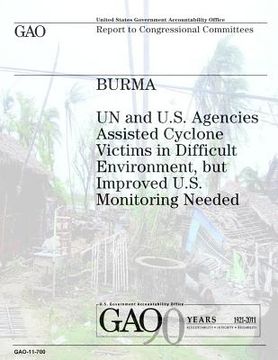Burma: UN and U.S. Agencies Assisted Cyclone Victims in Difficult Environment, but Improved U.S. Monitoring Needed (en Inglés)
Reseña del libro "Burma: UN and U.S. Agencies Assisted Cyclone Victims in Difficult Environment, but Improved U.S. Monitoring Needed (en Inglés)"
GAO-11-700. Cyclone Nargis hit Burma's impoverished Irrawaddy Delta on May 2, 2008, leaving nearly 140,000 people dead or missing and severely affecting about 2.4 million others, according to the UN. The Burmese military government initially blocked most access to the affected region; however, amid international pressure, it slowly began allowing international aid workers entry into the region. Since 1997, the United States has imposed sanctions to prohibit, among other things, the exportation of financial services to Burma and transactions with Burmese officials. In response to a congressional mandate, GAO (1) described the assistance UN and U.S. agencies have provided in response to Cyclone Nargis, (2) assessed USAID actions to help ensure funds are used as intended and do not benefit sanctioned entities, and (3) described the challenges responders experienced and the lessons learned. GAO reviewed financial and program documents; interviewed U.S., UN, and nongovernmental organization (NGO) officials; and traveled to Thailand and Burma. UN and U.S. agencies provided about $335 million for emergency response and recovery activities after Cyclone Nargis. Of that total, 11 UN agencies obligated roughly $288 million for assistance in various sectors, including food, health, water and sanitation, and agriculture. The U.S. government provided about $38 million of the UN's total as part of its roughly $85 million in obligations for emergency response and longer-term recovery activities. Of the $85 million U.S. response, the U.S. Agency for International Development (USAID), which led U.S. efforts, obligated about $72 million. The Department of Defense obligated about $13 million to procure and deliver emergency relief supplies. USAID took actions to help ensure U.S. funds were used as intended and did not benefit sanctioned entities, but had some monitoring weaknesses. USAID took actions prior to the delivery of assistance, including selecting partners experienced in working with USAID and in Burma and providing extra guidance to help ensure funds were not misused. To monitor assistance, USAID has conducted some site visits. However, USAID's monitoring contains little financial oversight and we found that two grantees charged USAID for unapproved international travel. Also, in some cases site visits were not sufficiently documented. USAID relies on external audits of grantees, but relevant USAID staff were not aware of audit findings related to one grantee's cash payments to villagers in Burma. The grantee subsequently addressed the audit findings. Lastly, U.S. and UN agencies said they examined reports of misuse of assistance in their programs and found no evidence that assistance had been misused. GAO's review of 16 after-action reports from donors, NGOs, and UN agencies, showed that those responding to Cyclone Nargis experienced similar challenges and developed lessons learned in four main areas: access, coordination, implementation, and limited in-country disaster response capacity. Responders found it difficult to reach affected areas because the Burmese government limited their travel and the infrastructure was poor. Responders also had difficulty coordinating between headquarters and field offices for several reasons, including limited telecommunication services. A U.S. report highlighted coordination challenges amongst U.S. agencies, stating that agencies' conflicting agendas resulted in difficulties related to the appropriateness, timing, procurement, and distribution of aid. Implementation challenges include supplies that were incompatible with local conditions, such as medicines with instructions printed in non-Burmese languages and difficulties monitoring aid.

